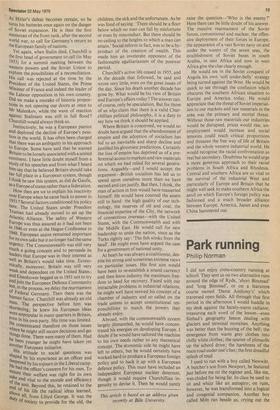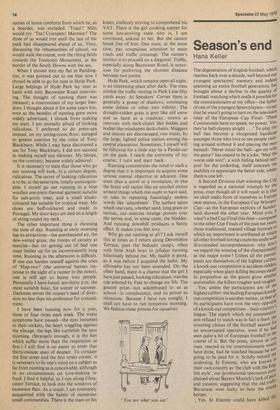Park running
Philip Norman
I did not enjoy cross-country running at school. They sent us on two alternative runs around the edge of Ryde, 'short Binstead' and long Binstead', or on a fearsome course named 'Dame Anthony's' which traversed open fields. All through that first period in the afternoon I would huddle in my desk against the barely-warm radiator, treasuring each word of the lesson—even Sinbad's geography lesson dealing with glaciers and terminal moraines. Anything was better than the buzzing of the bell; the emergence from warm grey clothes into chilly white clothes; the spatter of plimsolls up the school drive; the harshness of the main road under one's feet; the first dreadful splash of mud.
I used to run with a boy called Newwitt. A butcher's son from Newport, he featured just before me on the register and, like me, was chided for being fat. In class he used to sit and whiz7 like an autogiro; on runs, however, he was transformed into a logical and congenial companion. Another boy called Miln ran beside us, crying out the names of home comforts from which he, as a boarder, was excluded. 'Toast!' Miln would cry. 'Tea! Crumpets! Marmite!' The three of us would trot until the last of the pack had disappeared ahead of us. Then, discussing the inhumanities of school, we would walk the course, over the tilting fields towards the Tennyson Monument, at the border of the South Downs with the sea.
When I moved into my flat in Paddington, it was pointed out to me that now I should be able to go for runs in Hyde Park. Large helpings of Hyde Park lay near at hand with only Bayswater Road intervening. The thought of running there was pleasant; a concomitant of my larger freedom. I thought about it for some years but, even as the benefits of running grew more widely advertised, I shrank from making my start. I am mortally afraid of looking ridiculous. I preferred to do press-ups instead, on my sitting-room floor, enraged to greater exertion by the voice of Tony Blackburn. While [may have discovered a use for Tony Blackburn, [did not succeed in making myself any slimmer. My biceps, on the contrary, became widely admired.
It is necessary to state that those who go out running will look, to a certain degree, ridiculous. The secret of looking ridiculous is to be, at the same time, totally unrecognisable. I myself go out running in a blue woollen one-piece thermal garment suitable for sub-arctic wear, and a small khakicoloured hat suitable for tropical wear. My shoes are buff-coloured and made in Portugal. My door-keys are tied on a length of string round my neck.
The other important thing is choosing the time of day. Running at early morning has its attractions—the unexhausted air, the dew-wetted grass, the troops of cavalry at exercise—but on getting out of bed one must limber up for an inconveniently long time. Running in the afternoon is difficult. If one can harden oneself against the cries of 'Hup-two!' (the universal human response to the sight of a runner in the street), one is still apt to bump into people. Personally I have found ten-thirty p.m. the most suitable hour, for winter or summer. Darkness serves the runner's need of diversion no less than his preference for concealment.
I have been running now for a year, three or four times each week. The worst symptoms have passed—the eyes loosened in their sockets, the heart waggling against the ribcage, the legs like cuttlefish the next morning. (Strangely enough, it is the feet which suffer more than the respiration at first.) I still find it no easier to enter that thirty-minute span of despair. To conquer the first street and the first street corner, it is necessary to fix one's mind on a subject as far from running as is conceivable, although in no circumstances on love-making or food. I find it helpful, as I run along Gloucester Terrace, to look into the windows of basement flats. As a result, I am intimately acquainted with the habits of numerous small communities. There is the man on his knees, endlessly striving to comprehend his VAT. There is the girl cooking supper for some late-arriving male who is, I am convinced, unkind to her. But she cannot break free of him. One must, at the same time, pay scrupulous attention to main roads and traffic crossings. The runner's instinct is to proceed on a diagonal. Traffic, especially along Bayswater Road, is notorious for preferring the shortest distance between two points.
Hyde Park, which remains open all night, is an interesting place after dark. The trees subdue the traffic ranting in Park Lane fifty yards away. At Speakers' Corner there is generally a group of shadows, continuing some debate or other into infinity. The drought-ridden grass is grey like old snow and as hard as a roadway, strewn at intervals with deck-chairs like bodies and bodies like misshapen deck-chairs. Muggers and thieves are discouraged, one trusts, by the large, lighted police station among the central plantation. Sometimes, I myself will be followed for a little way by a Panda car on the path. I reach the extremity of my course; I turn and start back.
Running concentrates the mind to such a degree that it is important to acquire some serious mental objective in advance. One must plan a novel or a revolution, or else the brain will racket like an unoiled piston around things which one ought to have said, or take to repeating hauntingly useless words like 'adumbrate'. The surface upon which one runs, whether sand, long grass or tarmac, can exercise strange powers over the nerves and, in some cases, the bladder. And running downhill produces a funny effect. It makes you feel sexy.
Why go out running at all ? I ask myself this at times as I return along Devonshire Terrace, past the bedouin camps, often with little Arab boys in jellabas running hilariously behind me. My health is good, as it was before I acquired the habit. My silhouette has not been amended. On the other hand, there is a chance that the girl I have just passed, looking ridiculous, was the one selected by Fate to change my life. The greater prize—not adumbrated to us at school—is complacency, and its power to intoxicate. Because I have run tonight, I shall not have to run tomorrow morning. We fashion these prisons for ourselves.



































 Previous page
Previous page